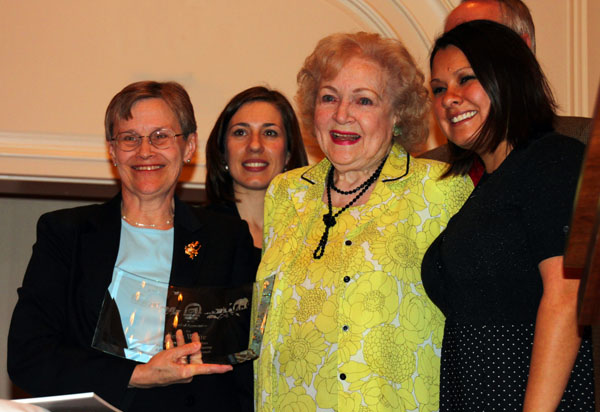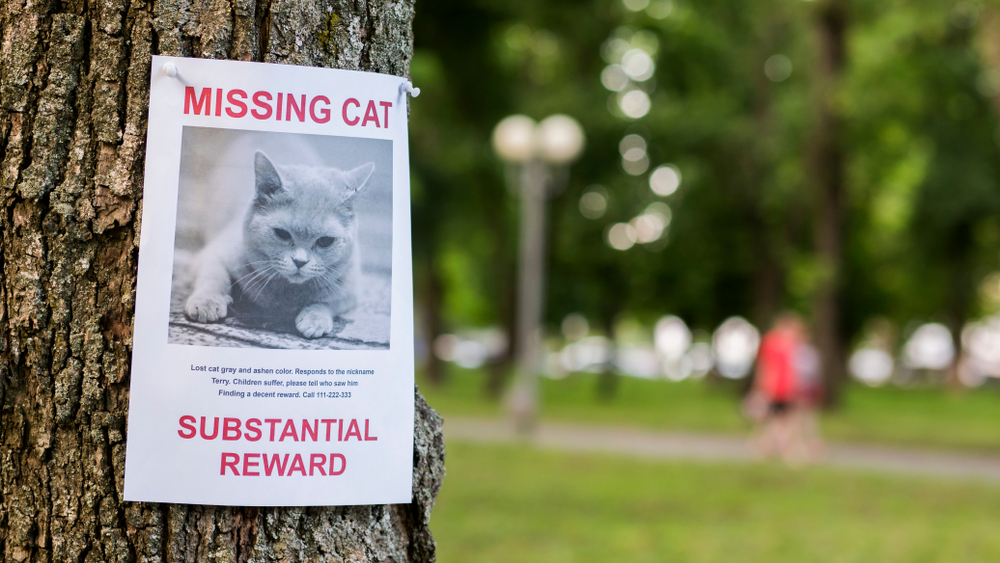She was extremely gracious, and despite being an 88-year-old with a schedule that I’d struggle to maintain, she was bubbling with enthusiasm in describing the work that she and the Morris Animal Foundation have accomplished in the 43 years that she’s been affiliated with them. She’s been on their board since 1971 and has sponsored nearly 30 health studies for the foundation.
KAREN: Good afternoon, Ms White. Since my audience consists of cat lovers, my questions will be primarily related to cats, if that’s okay.
BETTY WHITE: Of course! I love kitties! Cats are such a special part of people’s lives. I’ve been with the Morris Animal Foundation for 43 years and we have a wonderful program on healthy cats — it will help improve the health of cats in shelters so that they have a better chance for adoption. It’s a marvelous study and Hills Pet Food has been very supportive, so it’s marvelous that we’re able to work with cats as well as all the other animals.
KAREN: And cats are especially good pets for seniors, since they usually require less
maintenance than dogs.
BETTY WHITE: Yes, they don’t have to be walked, they take care of themselves and they’re wonderful conversationalists — they let you know everything they’re thinking.
KAREN: (laughs) Oh, yes, I know about that — I have a very vocal Siamese who lets me know everything that he’s thinking!
Now, as you know, chartible donations are down across the board. Many people like me who’ve traditionally given to 6 or 8 or more animal charities over the course of a year are cutting back to 2 or 3. What would you say to someone to convince them to contribute to the Morris Animal Foundation, rather than some of the higher profile animal charities?
BETTY WHITE: Well, first of all, I know them better (even though I know a lot of animal charities), but I’ve seen the wonderful work they’ve done over the years. We helped develop the first feline leukemia vaccine and helped develop the parvovirus vaccine for dogs which has saved thousands of lives, and the Potomac horse fever vaccine, and they’ve done so much work also in the area of wildlife, that I think our humane studies are very important. Right now we have a huge canine cancer study and a drive to eliminate canine cancer which is the number one killer of dogs in the world — we are really concentrating on finding a cure for that.
KAREN: Yes, I’m very aware of Morris’ work with canine cancer — Dogster had a subscription drive to raise money for MAF’s canine cancer program, as well as a drive to raise funds for Morris’ Healthy Cat Campaign to help shelter cats.
BETTY WHITE: That’s just wonderful.
KAREN: MAF has also conducted studies on Feline asthma?
BETTY WHITE: Yes, they have. That was another wonderful study.
KAREN: It should also be pointed out that Charity Navigator ranks MAF as a fourstar charity, its highest rating, and MAF is an accredited member of the BBB Wise Giving Alliance. Your money goes to benefit the animals, not to make some administrators rich.
BETTY WHITE: Yes, it’s a very good charity.
KAREN: In December, MAF sponsored a survey on the negative perceptions of cat ownership. More than half of those surveyed had negative perceptions of cats, although most of their complaints were related to behavioral issues (scratching, jumping on counters, litter box odors) that Dr. Patricia Olsen of MAF points out can be readily addressed with proper training of both cats and their owners.
The good news is, they found that 10% of those surveyed who do not currently have cats, are considering adopting a cat. And if 10% of U.S. households who do not currently own a cat adopted one, an additional 6.2 million cats might find happy furever homes and be saved from euthanasia at a shelter.
What would you say to these on-the-fence people, to move them from thinking about owning a cat to actually taking the steps to adopt one?
BETTY WHITE: Well, the problem is that there are so many people who say they love animals but they say they don’t like cats but love dogs well, it’s because they don’t know — they’ve never been around a cat and don’t know what good company that a cat can be, and what a low-maintenance pet the cat is.
They’re perfect for people who are busy and don’t have time to walk the dog. They’re brilliant conversationalists and provide wonderful company. They’re really a little health engine, they make you feel better no matter what you’re doing. I think the more we can spread the word about what wonderful pets cats are, particularly for people who live alone or older people, the more cats we can get adopted out. You know, cats force you to think about something besides yourself which is terribly important.
KAREN: It sure is! A lot of my readers are interested in wildlife, and the Morris Animal Foundation does work, not only with cats and dogs but also with wildlife. What sort of wildlife programs is the Morris Animal Foundation involved in?
BETTY WHITE: Well, for one, there would no longer be Mountain Gorillas on the planet if it weren’t for the Morris Animal Foundation. We work on increasing populations in the wild, including working on Legal Protection for California Sea Otters, Reproductive Help for Cheetahs, Assisted Breeding for Amphibians, and veterinary care for Mountain Gorillas, Safer Anesthesia for Giraffes, and Diagnostic Tests for Infectious Disease in Turtles. They make life better for animals all over the planet.
I want to thank you, Karen, so much, for this time, believe me, both Morris Animal Foundation and I appreciate you spreading the word, trust me.
KAREN: I’m thrilled to do it. Any chance you’ll be hosting Saturday Night Live?
BETTY WHITE: (laughs) I don’t even know where that came from!” she says. “I don’t think Lorne Michaels even knows about it!”
-
-
- Betty White fans, join the Facebook Group to promote her appearance on SNL!
-
- Check out the Morris Animal Foundation. If you know someone who’s lost a pet lately, you can send remembrance cards/donations in the pet’s name.
-
Morris Animal Foundation (MAF) was founded in 1948 and initially focused on developing a healthy canned dog food. Since then, they’ve gone on to develop the first vaccine for Feline Leukemia and a promising treatment for renal failure (fenoldopam), research therapies for feline asthma, and diagnostic possibilities for hyperthyroidism.
Here’s more about MAF:
About the Morris Animal Foundation
Mark L. Morris Sr. founded Morris Animal Foundation in 1948. Dr. Morris was a veterinarian, humanitarian, and visionary who pioneered advancements in nutrition and the development of today’s quality dog food. Sadly, back in the 1930s and ’40s commercial dog food usually included only the most wretched ingredients. In some instances, dogs were actually sickened by these foods. In many cases, due to the lack of nutritional value in the food, dogs suffered from chronic malnutrition and its terrible, painful effects.
One of Dr. Morris’ first patients was Buddy, among the first guide dogs in the United States. Buddy was suffering from kidney failure. Morris Frank, Buddy’s owner, was a blind man and national ambassador for The Seeing Eye, the oldest guide dog school in the country. He heard of Dr. Morris’s success in nutrition and sought him out in a desperate effort to save his dog’s life. Dr. Morris devised a special diet for Buddy, and Dr. Morris’ wife, Louise, personally packaged the meals in their garage.
Due to the new diet, Buddy’s health dramatically improved. Word spread quickly among veterinarians and others. Dr. and Louise Morris began a small canning operation from their kitchen and garage but could not keep up with the escalating demand. Dr. Morris met with Burton Hill, owner of the Hill Packing Company, and the two teamed up to produce Dr. Morris’s innovative dog food for sale by veterinarians. This agreement inspired what is today the line of Prescription Diet pet foods, manufactured by Hill’s Pet Nutrition and available exclusively through veterinarians. Read more about Hill’s Pet Nutrition.
The contract between Dr. Morris and Mr. Hill stipulated that a percentage of the price of every can sold would go to the newly formed Buddy Foundation, named in honor of Morris Frank’s beloved Seeing Eye dog. This later became known as Morris Animal Foundation. Royalties to MAF ended in the late 1960s. The financial agreement enabled Dr. Morris to establish his dream a foundation where animals were #1, and their welfare and health the sole, unwavering focus.
His vision continues to this day, and MAF is concerned with the complete spectrum of pet and wildlife health issues such as cancer, diabetes, heart and renal diseases, and many others.








